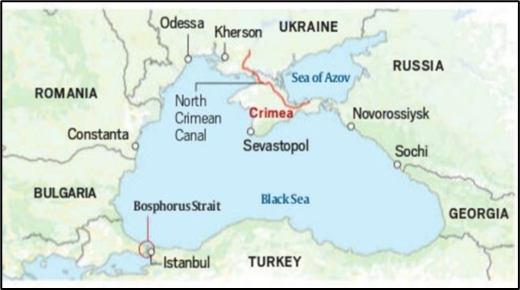Why in News?
U.S. President Donald Trump, in an interview with Time, stated that Crimea will stay with Russia and suggested that the region had effectively been handed to Putin during Obama’s Presidency. He reportedly urged Ukraine to accept a peace deal recognizing Russia’s 2014 annexation of Crimea.
Experts caution that while tolerating a long-term occupation might be pragmatic, formally accepting a border change enforced by military force would mark a significant and troubling shift in U.S. foreign policy.
What’s in Today’s Article?
- The Strategic Importance of Crimea
- Context of Crimea in the Current War
- Donald Trump’s Proposal on Crimea
The Strategic Importance of Crimea

- Geographic Significance
- Crimea holds immense strategic value due to its location, benefiting both from its own geography and that of Russia.
- Russia’s Historical Quest for Warm Water Ports
- Most of Russia’s coastline lies in the Arctic region, making many ports unusable during winter.
- Hence, gaining access to warm water ports has been a long-standing goal of Russian foreign policy.
- Black Sea – Russia’s Gateway to the Mediterranean
- The Black Sea provides Russia with its warmest waters and the only direct maritime access to the Mediterranean via the Turkish-controlled Bosphorus and Dardanelles straits.
- Control of these straits has historically been viewed as critical to Russia’s economic and military interests.
- Sevastopol – The Naval Stronghold
- Unlike other shallow Black Sea ports, Sevastopol in Crimea is a deep-water port ideal for hosting the Black Sea Fleet.
- It has been central to Russia’s maritime strategy since the 18th century and became a focal point in post-Soviet tensions with Ukraine.
- Post-Soviet Disputes and Agreements
- After the Soviet Union's collapse, the 1997 Kharkiv Pact allowed Russia to retain its naval base in Sevastopol, even though Crimea was part of Ukraine.
- This lease was extended until 2042, but Russia unilaterally ended the agreement during its 2014 annexation of Crimea.
Context of Crimea in the Current War
- 2014 Political Upheaval and Russian Annexation
- After the ousting of pro-Russian President Viktor Yanukovych in February 2014 by a pro-Western movement in Ukraine, Russian forces swiftly occupied strategic locations in Crimea.
- By mid-March, Crimea was formally annexed by Russia following a declaration of independence and a request to join the Russian Federation.
- Russia’s Strategic Motives for Annexation:
- Securing Sevastopol
- The renewed lease in 2010 was opposed by the new Ukrainian leadership.
- Russia feared losing access to the naval base in Sevastopol if Ukraine consolidated power.
- NATO Expansion Fears
- The Kremlin was alarmed by the prospect of Ukraine joining NATO, which would place the alliance on Russia’s Black Sea border, undermining Russian security interests in what was once a "Soviet lake."
- Crimea as a Launchpad for Invasion
- Control over Crimea was seen as essential for any future military action in Ukraine.
- The 2022 invasion was partly enabled by Russia’s fortified presence in the peninsula.
- Current Status
- While Ukraine controls the city of Kherson, Russia holds much of the surrounding oblast and thus maintains effective control over the canal’s operations.
Donald Trump’s Proposal on Crimea
- Crimea was part of Russia for centuries before being transferred to Ukraine in 1954 by Soviet leader Nikita Khrushchev.
- Putin does not accept this transfer and considers it a historical mistake. Trump’s proposal aligns with this and legitimizes Russia’s claim over the peninsula.
- By freezing Ukraine’s political map as it stands today, the US will secure Crimea — and the canal — for Moscow for the long term.
- Ukraine’s Rejection
- Ukrainian President Volodymyr Zelenskyy firmly rejected any deal that involves ceding Ukrainian territory, emphasizing that such an agreement would violate Ukraine’s constitution.
- Geopolitical Risks and Consequences
- Commentators argue that accepting Trump’s proposal would be disastrous for Ukraine, as it could embolden Russia to eventually conquer all of Ukraine.
- Furthermore, such a concession might set a dangerous precedent for other authoritarian regimes, notably China, regarding territorial ambitions, such as over Taiwan.










